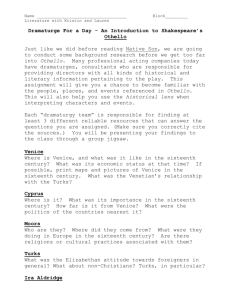

There is a pleasant sweetness in the simplicity of the language used in this line.Īddressing the “signiory” in (I.iii), he declares that he would forfeit his life if he was guilty of any crime: “let your sentence even fall upon my life”.

In (I.ii), he declares that he is in “love” with “the gentle Desdemona”. Shakespeare’s depiction of the protagonist as a romantic hero adds to his greatness, especially to a Renaissance audience who appreciated tales of courtly love. Significantly, Othello admits he is “not valiant” to Emilia in the final moments of the play, completing his reversal from the courageous General to the fallen hero. For example, when enters (I.iii), the First Senator and, importantly, the Duke welcome him with this praise. The adjective “valiant” is associated five times with Othello. Writers use epithets as a shortcut to define their characters quickly to the audience. Confidence is always an attractive trait in the leading player. This theatre metaphor reduces Brabantio to a stage hand while comparing the protagonist to an actor who does not forget their lines and movement. His response continues to be calm and measured: “were it my cue to fight, I should have known it without a prompter”. Othello reiterates his demand for a peaceful resolution in the line “hold your hands” after Brabantio orders his officers to “lay hold upon him” and “subdue him at his peril”. Perhaps the famous actor Richard Burbage, who played Othello in the original productions in The Globe, was previously cast as Benvolio and the line is a tribute to the peacemaker.Įven if these echoes were not the author’s intentions, the actor’s poised delivery of the lines are enough to confirm the character’s noble “being” and greatness. There is also a possible sentimental allusion to the opening scene of Shakespeare’s “Romeo and Juliet” when Benvolio attempts to quell the clash between the Montagues and Capulets, demanding that they “part, fools!” and “put up your swords”. If this connection was intended, then the playwright wanted to the audience to view Othello as incredibly noble and innocent. Shakespeare may be alluding to the moment when a “band of men and officers” confronts Jesus in the Garden of Gethsemane and he tells Peter to “Put up thy sword into the sheath” (John 18:1-11 Holy Bible: King James Version). There is a lovely contrast between the violent freshness of the “bright swords” and how they will simply be left to “rust” because they are not needed. When the “Officers with torches” arrive to arrest him, Othello’s eloquent and persuasive imperative to “keep up your bright swords, for the dew will rust them” epitomises his composure under dangerous pressure.

It is clear that Othello’s knowledge and understanding of the battlefield is impressive, but the character’s wisdom is also evident in the way he placates Brabantio in (I.ii). The rhetorical flourish in the alliteration here adds to the epic quality of his “dearest action in the tented field”. In (1.iii), Othello reminds the “most potent, grave and reverend signiors” of his “feats of broil and battle”. His reputation as a trustworthy soldier is immediately confirmed when Cassio arrives on stage to tell Othello in (I.ii) that he is “hotly called for” by the most powerful man in Venice, the Duke. This repetition is Shakespeare’s way of reminding the audience of Othello’s greatness and suggesting the tragic hero should retain our admiration. He repeats this idea in his final monologue in (V.ii) when he calmly says “I have done the state some service”. The eponymous hero has an impressive history of important victories for the Venetian government which he euphemistically calls his “services” in (1.ii).

The protagonist mentions his lineage to Iago as proof of his greatness and that he will not lower himself to Brabantio’s poisonous “scurvy” and “provoking terms”. Not only has he inherited the powerful authority and titles of royalty in his “life”, the reference to “being” suggests he also has the dignity and nobility expected of such a significant rank. Othello claims he is descended from “men of royal siege” in both “life and being”. At the start of the play, Othello is certainly an eminent character who commands the admiration of the audience. Aristotle argued that a tragic hero should be highly respected, prosperous and from an illustrious family.


 0 kommentar(er)
0 kommentar(er)
